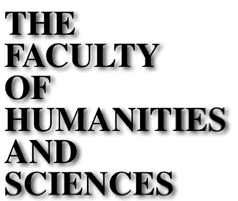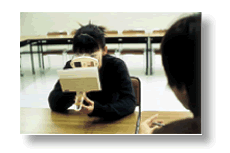 |
 |
Department of Man and Culture
Nurturing individuals who think for themselves about the relationship between human beings and culture, and who can create and communicate a new way of seeing
Basic literacy, education, and abundant specialized education courses
The curriculum for the Department of Man and Culture incorporates general education course content as well as specialized education courses. Through basic
courses such as linguistics (in the basic literacy courses) and information processing, students develop the skills necessary to understand and clearly sum up the meaning of such fundamental concepts as
“information” and “the ability to communicate.” As they broaden their range of interests and basic education, they begin their studies in specialized fields.
In terms of the basic abilities required for specialized education, our curriculum is notable in that its structure emphasizes both linguistics and
computers. The courses utilize laptop computers that each student prepares for his or her own personal use. In this way, students are able to quickly cultivate basic skills that can be applied when they enter
the workforce, while at the same time increasing the overall efficiency of their studies.
Taking the initiative to probe the depths of history and culture to find true meaning
The Department of Man and Culture, the Faculty of Humanities and Sciences - which has as its goal “the search for cultural information” - takes
into consideration every aspect of the process of how information relating to “humans and culture” is created, refined, transmitted, and accumulated. This process encompasses a variety of fields,
including thought, art, literature, language, and history. Our aim is to educate individuals with the ability to transmit and clearly express the results of these studies to society at large.
For this reason, we have placed a great emphasis on seminars in the Department of Man and Culture. Classes characterized by close relationships with the
instructors begin with the Introductory Seminar on Man and Culture, and maintain these characteristics through to the fourth year, when instructors provide guidance in the creation of the student's Graduation
Thesis. Studies include not only materials on the Internet and in existing literature; they also incorporate practical fieldwork in which students visit key locations to gather information firsthand.
The most important thing is that students think for themselves, and seek out the meaning hidden in cultural information. They must create a new point of
view, and transmit this to the rest of society. Thought must accompany action, as action must accompany thought. When students accomplish this, they will be sure to discover an entirely new view of human
culture.
Fascinating courses in specialized fields improve cultural information skills
Specialized education courses begin from the first year of study. Courses begin with a confirmation of the basic knowledge in each of the five fields, and gradually move on to advanced analysis, and then to an even broader spectrum that includes other fields of study. All five fields are interesting areas that are essential to the study of cultural information, and each leads to the acquisition of various certifications (e.g., teaching profession or curator). Gradual development and study spanning four years culminates in an investigation that is a world first: a Graduation Thesis based on one of the student's own original concepts.
Fields of Study in the Department of Man and Culture
| Cultural Structure Study | Literature Study |
| Art and Culture Study | Historical Information Study |
| Language and Culture Study |
Department of Human Behavior
Probing the human heart and human behaviors as we nurture individuals with strengths in the fields of society, education, and the environment.
Basic literacy, education, and abundant specialized education courses
The curriculum for the Department of Human Behavior incorporates general education course content as well as specialized education courses. Through basic
courses such as linguistics and information processing, the basic literacy courses help students develop the skills necessary to understand and clearly sum up the meaning of such fundamental concepts as
“information” and “the ability to communicate.” As they broaden their range of interests and basic education, they begin their studies in the specialized field of Human Behavior.
In terms of the development of basic abilities required for specialized education, our curriculum is notable in emphasizing both linguistics and computer
skills. The courses utilize laptop computers that each student prepares for his or her own personal use. In this way, students are able to quickly cultivate basic skills that can be applied when they enter the
workforce, while at the same time increasing the overall efficiency of their studies.
Working toward the development of individuals capable of a new understanding and of new contributions in the context of “Human Beings and Society”
The goal of the Department of Human Behavior in the Faculty of Humanities and Sciences is “Research into human beings, society, and the
environment.” We delve into such issues as the types of environments in which people are born, are raised, and live their lives, as well as the type of society that people endeavor to create when
individuals come together into a group. Then, we aim to transmit the ideas generated through such research to all corners of the world, assisting in the development of individuals who can contribute to society
in relation to such fields as human emotion and behavior, society and education, and the environment.
The Department of Human Behavior is involved in a broad range of studies, involving both individuals and groups, and including human emotion and behavior,
society, education, and the environment. It differs from the Department of Man and Culture, however, in that the starting point of these studies is found in “the living human.” To encourage a deeper
human understanding, students not only study from the existing literature; they also conduct practical fieldwork in which they visit key locations themselves to gather information.
There are certain elements that are common to all departments in the Faculty of Humanities and Sciences. Students are encouraged to communicate with
others, and to gather and analyze information on their own; they also develop the ability to propose their own new ideas and approaches, and to transmit these new ideas to various levels of society through the
Internet and other forms of media. Students in the Department of Human Behavior, after polishing these skills and satisfying all the requirements of the specialty courses, are qualified to enter professions
such as education, counseling, adult education administration, corporate personnel divisions, environment and welfare, or as instructors in the field of lifelong education. Students
are provided with all the backup they require as they voluntarily seek out and research their preferred theme of study.
Fascinating courses in specialized fields make for stronger human beings
Specialized education courses begin from the first year of study. Courses begin with a confirmation of the basic knowledge in each of the five fields, and gradually move on to advanced analysis, and then to an even broader spectrum that includes other fields of study. All five fields are areas essential to the study of human behavior, and each leads to the acquisition of various certifications (e.g., teaching profession or curator). Gradual development and study spanning four years culminates in a graduation thesis based on the student's own original concepts.
Fields of Study in the Department of Human Behavior
| Personal Development Study | Behavioral Development Study |
| Social Relation Study | Social Structure Study |
| Human Environment Study |